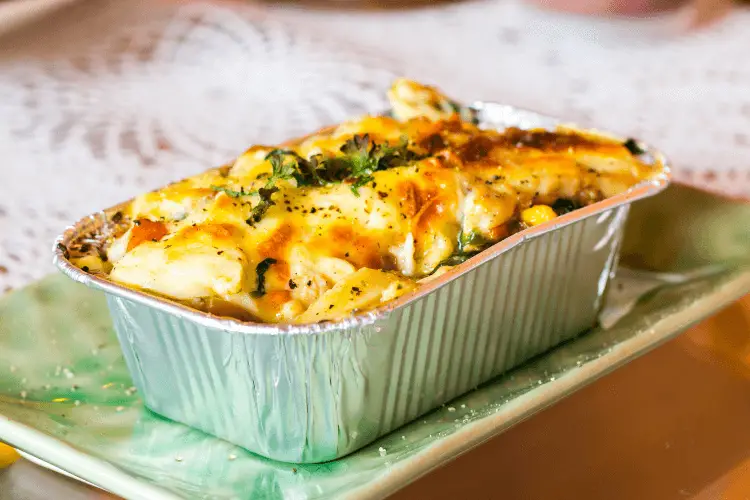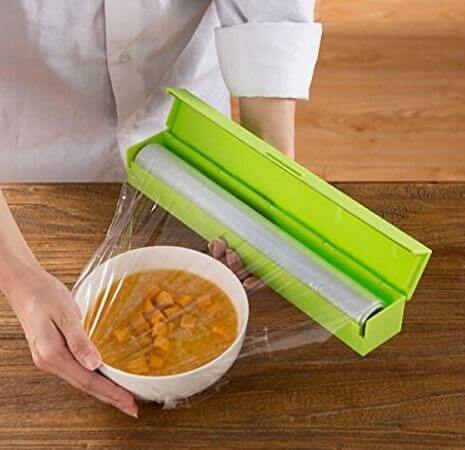Nowadays, almost everyone uses a microwave to heat food. It has become an essential appliance in the modern-day kitchen due to its convenience and fast cooking abilities.
And although it’s not mandatory, it’s good to cover your food with a cover or wrap when cooking it in the oven.
Covering the food as you cook in the microwave prevents it from drying out. The wrap also prevents your food from potential splatter.
Well, the wrap you use to cover your food needs to be microwave safe. You don’t want to expose your food to chemicals that can be deadly.
Most people use saran wrap to cover their food. But the big question is, can you microwave saran wrap? Yes, you can, but the saran wrap has to be microwave-safe.
You also need to ensure that the wrap doesn’t come into direct contact with your food.
What is Saran Wrap?
Saran wrap is the plastic wrapping we use to wrap food. It is also referred to as cling film. The wrap covers food in containers to keep it fresh.
You can buy the wrap from a local grocery store. It is usually housed within a cardboard box with a cutting edge that enables you to cut off the length of the wrap you need.
Saran wrap was initially discovered in 1933 when a worker from Dow Chemicals (Ralph Wiley) was having difficulties cleaning beakers used to develop dry-cleaning products.
Initially, it was developed as a spray to protect military aircraft from the adverse effects of sea salt. Automobile manufacturers also used it to protect car seats.
Later, Dow chemicals developed polyvinylidene chloride into Saran wrap in 1949.
So, Can You Microwave Saran Wrap?
Most people use saran wrap to cover foods before placing them in the microwave. However, it would help if you were extra careful when using this wrap as it can be harmful to your health and the environment.

In fact, according to USDA, you can safely use a saran wrap in your microwave. You just need to ensure that the wrap doesn’t touch the food itself.
When covering food in a container, ensure that there’s an air gap between the plastic wrap and the upper surface of your food.
If possible, put your food in a deep bowl or a shallow one to heat the foods you intend to serve your loved ones. If the film doesn’t touch the food, microwaving shouldn’t be a problem.
Precautions on Using a Saran Wrap in a Microwave

Although it’s safe to use saran wrap in a microwave, you need to consider the following precautions:
- The wrap shouldn’t come into direct contact with the food
Leave about an inch space between your food and the saran wrap. If your food is wrapped in the saran wrap, unwrap it and place it in a microwave-safe container like a bowl and cover the top.
- Ensure that the food and the wrap do not touch.
Ensure that foods high in sugars and fats don’t touch the saran wrap
Foods such as fatty meats, pie, or cheese should not touch the saran wrap. Such foods heat up pretty fast and can get extremely hot.
At high temperatures, these foods can melt the saran wrap if in direct contact. Ingesting the melted saran wrap is unsafe and should be avoided at all costs.
- Avoid steam buildup
It’s pretty common for steam to build underneath the saran wrap. And this is extremely dangerous as the hot steam can burn the skin.
To prevent steam from building up underneath the wrap, use a sharp object to puncture it and allow steam to escape.
- Avoid Microwaving for long periods
Although it’s safe to microwave a saran wrap, avoid using it at high power levels for long. It’s actually safer to microwave food for 2 minutes at 50% power than microwaving it at 100% for 2 minutes.
If microwaving food for more than 5 minutes, heat the food in 5-minute intervals with 1-minute breaks in between. This prevents your food from overheating and melting the wrap.
Frequently Asked Questions
Q: Is it safe to cook with saran wrap?
Although saran wrap is free of phthalates and plasticizers that could leach toxins, you shouldn’t let it come into contact with your food. Place your food in a container and then cover it with the wrap.
Q: Is saran wrap safe to heat?
The Saran brand website states that the wrap can be microwaved but not heated in the oven. It’s unsafe to use in conventional ovens, browning units, stovetops, or toaster ovens.
Q: Is cling film heat-resistant?
Cling film isn’t heat-resistant and should never be used in the oven. It can melt when exposed to heat, making your food unsafe to eat.
Q: At what temperature does a saran wrap melt?
Because the wrap is preventing steam from escaping, it gets wet. The moisture prevents it from getting hotter than 212 degrees.
The wrap won’t melt until it gets to 220 – 250 degrees.
Q: Is saran wrap the same as cling film?
Yes, saran wrap is also known as cling film or plastic wrap.
Q: Is saran wrap airtight?
Saran wrap is airtight if its seal is wide enough around the lip of your container.
Q: What can I use instead of saran wrap?
Instead of saran wrap, you can use greaseproof paper, wax paper, or foil. They are preferable in covering some food items such as cheese as they don’t trap moisture, which can breed mold.
Q: Which is better, saran wrap or foil?
Saran wrap is the best for storing acidic foods. It’s also malleable and doesn’t react with anything. And for most fresh products like fruits, it can seal them tighter than foil.
Q: Should I wrap my potato in saran wrap before placing it in the microwave?
Don’t warp your potatoes in saran wrap, as it contains leachable plastics that can end up in your food. Remember, you also need to prick up your potato all over before putting it in your microwave.
Q: Is saran wrap flammable?
Yes, it is, but it melts first. The incomplete oxidation gives off toxic gases.
Conclusion
Covering your food with saran wrap is one way of keeping your food fresh and preventing it from splattering when heating in the microwave. So yes, you can use saran wrap in the microwave(1).
But you need to be extra careful when shopping for these wraps. Although the label indicates that it’s microwave safe, this might not always be the case.
Consider shopping for these wraps in a brick-and-mortar supermarket as these adhere to strict government standards. The chances of getting the “real deal” are very high here.
If you get the suitable saran wrap, you’ll have nothing to worry about.
Sources:
- http://www.saranbrands.com/plastic-wrap/
- https://www.huffingtonpost.com/2011/11/30/microwaving-with-plastic-wrap-safety_n_1121271.html
- https://www.cancercouncil.com.au/86099/cancer-information/general-information-cancer-information/cancer-questions-myths/environmental-and-occupational-carcinogens/plastic-food-containers-and-cling-wraps-designed-to-be-used-in-microwaves-do-not-cause-cancer/
